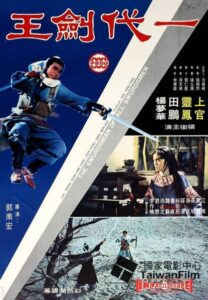Director: Joseph Kuo
Cast: Polly Shang-Kwan, Tin Peng, Miu Tin, Tin Yau, Sit Hon, Kong Nam, Cho Kin, Go Ming, Liu Chu, O Yau Man, Hung Fa Long, Lee Tso Nam, Ngai So
Running Time: 85 min.
By Will McGuire
The Swordsman of All Swordsmen is a film in a unique position in 2024: despite being a little seen but highly regarded early film from one of the legendary directors of the “Kung Fu Boom” it is effectively playing second banana on its own release from Eureka Video because it has been paired with the long awaited issue of The Mystery of Chessboxing, a seminal kung fu film made eleven years later by the same director.
Don’t be fooled, though. The Swordsman of All Swordsmen is no mere appetizer rather, it is a technically assured, impressively staged, beautifully restored wuxia classic that bears heavy influence from both King Hu’s Dragon Inn and Cheng Cheh’s The One Armed Swordsman both of which had been produced the previous year and both had been blockbuster successes in the Chinese speaking world. Not only is this film worthwhile on its own as a piece of cinema, but it is a fascinating historical document for those interested in how the wuxia genre came together on screen in the late 60’s outside of the mighty backlot of Shaw Brothers.
Wandering swordsman Tsai (Tien Peng) is obsessively scouring the countryside for a group of swordsmen who killed his father twenty years ago. As his quest reaches completion he’s joined by swordswoman Flying Swallow (Dragon Inn star Polly Shang-Kuan Ling) but this alliance complicates his mission when he discovers that his final target is Swallow’s aged father who is no longer the same man he was all those years ago.
I’m continually impressed by early wuxia films and how they introduce plot complications and deconstructions that we would associate in other genre booms with later, revisionist pieces. Just as in One Armed Swordsman, the central plot themes of The Swordsman of All Swordsmen deal in the complicated web of loyalties and obligations that make life in the martial world possible. This film complicates things a step further: it’s not simply a question of whether or not to exit the martial world but what to do when, as Faulkner puts it, the human heart comes into conflict with itself.
Kuo marries these concerns with probably the most gorgeous camera work of his career. I’m mainly familiar with his work during the Kung Fu Boom of the early 70’s, where I think it is fair to say he’s held in esteem for his energy and creativity in doing so much with so little to make his films feel grand, but here he’s working with the apparatus of Taiwanese cinema at a point where it was first spreading its wings and discovering what it could do and it shows in the beautiful compositions and nimble camerawork.
There’s been a lot of talk online about how shots in this film bear a strong Kurosawa influence, and I can see that. I would draw attention to a less discussed influence present in the film: the use of handheld camera work (including a couple really striking POV shots during fights) that would have still been novel from Cheng Cheh using them on One Armed Swordsman the year before. It’s also almost unfair to compare the work to King Hu given how much of the same resources used here were employed on Dragon Inn but the sequence wherein Tien is surrounded in a forest and fights moving through the shadows struck me as almost a dry run for the “bamboo forest” sequence in Hu’s masterpiece A Touch of Zen which debuted two years later.
The only caveat I have is that, as with all classic wuxia films of this period, if you’re coming to this primarily as a fan of contemporary martial arts films you may be put off by the level of melodrama in the script but even then this is a taut 85 minutes with at least three show stopping fights. The Swordsman of All Swordsmen is more than just a table-setter or a time capsule– this is a wuxia crowd pleaser that still delivers.
Will McGuire’s Rating: 8/10




